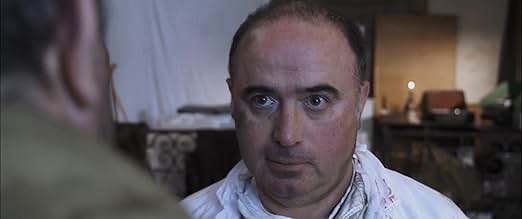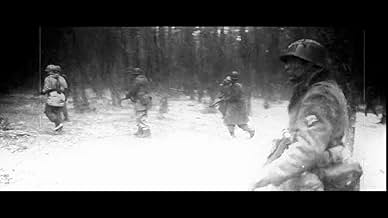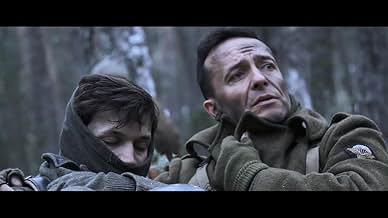January 1945. The first French regiment of paratroopers to fight with an American unit prepares to liberate Alsace in France during World War II.January 1945. The first French regiment of paratroopers to fight with an American unit prepares to liberate Alsace in France during World War II.January 1945. The first French regiment of paratroopers to fight with an American unit prepares to liberate Alsace in France during World War II.
- Awards
- 5 nominations total
Tommy-Lee Baïk
- Melbarte
- (as Tommy Lee Baïk)
Natale Naccari
- Moretti
- (as Naccari Natale)
James Larabee
- Franois Henaq
- (voice)
- Director
- Writer
- All cast & crew
- Production, box office & more at IMDbPro
3.9329
1
2
3
4
5
6
7
8
9
10
Featured reviews
EXtremely predictable, but otherwise smart
This is a WW2 film about disgruntled, weary soldiers from different nations in a frozen forest.
There is a lot of "smartness" to this. Some people won't like the disjointed dialog with pauses between lines, but that is how people spoke long ago. The constant "I interrupt the speaker cause I'm superior and he's inferior" dialog has been evolving in Western culture for the past 40 years.
But there was a time when being a brat wasn't praised the way that being a brat is praised today. And you thought the Nazis lost the war?
The only real drawback is how predictable the fate is for almost every character. It follows the Hollywood formula guideline of contriving bullets to only hit characters who are relatable, but never can find characters who are just hateful for no reason.
That, of course, has almost always been the Hollywood formula, although it wasn't preached as much until the mid sixties on into the eighties.
Very contrived, very predictable, but the dramatics are very good, and the characters do feel right for the times due to the constant pauses and lack of dialog among a tired group of soldiers.
There is a lot of "smartness" to this. Some people won't like the disjointed dialog with pauses between lines, but that is how people spoke long ago. The constant "I interrupt the speaker cause I'm superior and he's inferior" dialog has been evolving in Western culture for the past 40 years.
But there was a time when being a brat wasn't praised the way that being a brat is praised today. And you thought the Nazis lost the war?
The only real drawback is how predictable the fate is for almost every character. It follows the Hollywood formula guideline of contriving bullets to only hit characters who are relatable, but never can find characters who are just hateful for no reason.
That, of course, has almost always been the Hollywood formula, although it wasn't preached as much until the mid sixties on into the eighties.
Very contrived, very predictable, but the dramatics are very good, and the characters do feel right for the times due to the constant pauses and lack of dialog among a tired group of soldiers.
Appalling Direction Poor Acting Hackneyed Storyline
With a storyline that owes more than a little to "The Big Red One" this is predictable and, to be honest, boring.
The direction is amateurish and the overuse of a single hand-held camera detracts from whatever is happening as well as giving the movie the feeling of being incredibly low budget.
The action/battle sequences suggest that the director had absolutely no idea of how men react in battle and (again the mini-budget?) there was no advisor to tell him, but (just to stress one point out of very many) it shouldn't take a genius to figure out that men tend to go for cover when someone is trying to kill them.
All in all a terrible movie which fails on every level and in which you don't even care about the protagonists.
(PS I saw the French Language version with subtitles, which often read as absolute gibberish!)
Way better than a Russian made WW2 film
Ivan has nothing on this, historically accurate I paid 5 dollars to rent it on iTunes and enjoyed it
A magnificent story
Hi all
I have seen many comments criticizing the English dubbing but having seen the film in French VO I will not allow myself to judge as rajotd.
This film is a loyal historical testimony concerning the brave soldiers (american and french) who fought in the pocket of Colmar and the links between them.
Very well shot and with complete historical realism we note however the small budget allocated to the effects, more real than special ;-)
However, where the film draws all its excellence, it is in the singular story that it tells and in the links between close characters that it brilliantly highlights.
Throughout each scene, the director's passion is felt and during the course of the film we understand how the script has been worked to achieve this result.
Therefore it is a touching, realistic and ultimately both simple and complex film for the story it tells!
I have seen many comments criticizing the English dubbing but having seen the film in French VO I will not allow myself to judge as rajotd.
This film is a loyal historical testimony concerning the brave soldiers (american and french) who fought in the pocket of Colmar and the links between them.
Very well shot and with complete historical realism we note however the small budget allocated to the effects, more real than special ;-)
However, where the film draws all its excellence, it is in the singular story that it tells and in the links between close characters that it brilliantly highlights.
Throughout each scene, the director's passion is felt and during the course of the film we understand how the script has been worked to achieve this result.
Therefore it is a touching, realistic and ultimately both simple and complex film for the story it tells!
Pathetic film
Poorly acting bad dialogue incredibly bad battle scenes simply an abysmal movie
- How long is The Frozen Front?Powered by Alexa
Details
- Release date
- Country of origin
- Language
- Also known as
- Winter War
- See more company credits at IMDbPro
- Runtime
- 2h 20m(140 min)
- Color
- Aspect ratio
- 2.35 : 1
Contribute to this page
Suggest an edit or add missing content































